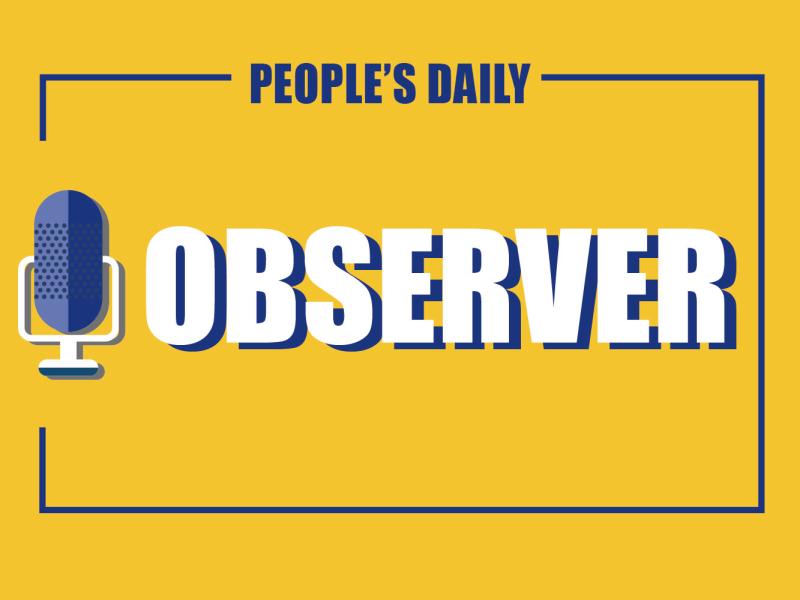
In October, China's Hong Kong Special Administrative Region (HKSAR) government issued the Prohibition on Face Covering Regulation which is powered by the Emergency Regulations Ordinance to stop violent protests and restore social order. The move has received broad support among Hong Kong residents. However, The Court of First Instance of the High Court of the HKSAR ruled on November 18 that some provisions of the anti-mask law were unconstitutional. The ruling has provoked great controversy in Hong Kong and the Chinese mainland.
The Hong Kong and Macao Affairs Office of the State Council and the Legislative Affairs Commission of the Standing Committee of the National People's Congress quickly responded to the ruling to clear up the confusion.
A spokesperson of the Legislative Affairs Commission of the Standing Committee of the National People's Congress (NPC) clearly pointed out, "The Constitution of the People's Republic of China and the Basic Law of the HKSAR together constitute the constitutional basis of the HKSAR. It is the Standing Committee of the National People's Congress only who are entitled to define whether the laws of the HKSAR comply with the Basic Law, not any other authorities." The remarks legislatively reaffirm the subject of the unconstitutional review, and the Hong Kong High Court has no power to make this ruling. The Emergency Regulations Ordinance, formed in the 1920s, was confirmed by the Standing Committee of the National People's Congress in February 1997 to comply with the Basic Law and was adopted as the law of the HKSAR. The Hong Kong High Court ruled that the Emergency Regulations Ordinance violated the Basic Law. The ruling is based on nothing, and it also challenges the authority of the Standing Committee of the National People's Congress, which would have adverse social and political influences.
The Hong Kong High Court's ruling states that the anti-mask law imposed invalid restrictions on fundamental rights and freedoms of citizens. In fact, the explanation does not have a leg to stand on since HKSAR Chief Executive Carrie Lam has emphasized that the law is designed to suppress violent rioters, and wearing the mask for medical and religious reasons could be exempted. It is obvious that the anti-mask law is in place to stop the escalating violence, the legal rights of Hong Kongers such as assembly and demonstration are not restrained by the law.
Over the past months, Hong Kong's violent protesters have committed multiple crimes including robbery, arson, assaulting police and assassinating patriotic Hong Kong lawmakers. They are destroying the rule of law in the city and threatening the safety of Hong Kong residents. In this case, the anti-mask law is in line with international practice and the expectation of Hong Kong society.
Some opposition lawmakers argued that the anti-mask law is unconstitutional since it bypassed the legislature and demanded a judicial review. Their aim is to incite more violence and delay the force of justice. With the district council election drawing near, violent protesters and forces behind them are creating new battlegrounds across the city, the High Court's ruling is apparently in favor of rioters. Upon the decision, masked radicals swamped streets swaggeringly, forming the largest-scale masked violent movement after the anti-mask law came out. The verdict in fact extracted the firewood from under the cauldron in ending violence and stimulated the masked rioters, which left Hong Kong residents in peril and impeded police's efforts of safeguarding law and justice.
The anti-mask law, as the opposed claimed, departs from the so-called "separation of the three powers", otherwise the court decision fittingly shows how jurisdiction curbs the executive power. Yet imitating the separation of powers indiscriminately does not adapt to Hong Kong's situations. Just as the spokesperson of China's NPC Legislative Affairs Commission put it, the decision severely undermines the power of the HKSAR chief executive to run the region according to law. The HKSAR Basic Law stipulates that Hong Kong's political system is executive-led rather than based on the separation of powers. The chief executive of HKSAR can adopt the negative vetting in an emergency.
Judicial authorities should hold hands together with administrative and legislative organs to shoulder the responsibility to stop violence and restore order. However it has occurred many times that courts released rioters whom police arrested, which worries many people with a sense of justice. Public interest will be in peril if judicial offices fail to carry on the rule of law and even hamper law enforcement. "We will continue to firmly support the chief executive in leading the Hong Kong Special Administrative Region government to govern in accordance with the law, firmly support the Hong Kong police in strictly enforcing the law, and firmly support the Hong Kong judicial bodies in severely punishing the violent criminals in accordance with the law," said Chinese President Xi Jinping at the 11th BRICS summit. Only through scientific legislation, solemn law enforcement and justice jurisdiction, can Hong Kong go back to stability and peace again.
From Hong Kong police intensifying law enforcement and fighting against rioters to setting up inter-departmental squads, we understand HKSAR's resolution, confidence and ability to deter violence. And we will continue to fully stand by Hong Kong government's efforts to thwart radical movements and bring back order to Hong Kong.
(Compiled by Ryan Yaoran Yu, Elaine Yuelin and Bai Yuanqi)


